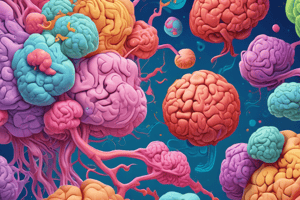Podcast
Questions and Answers
Which of the following prenatal stages is characterized by the highest sensitivity to teratogens due to major organ and body system development?
Which of the following prenatal stages is characterized by the highest sensitivity to teratogens due to major organ and body system development?
- Germinal Stage
- Embryonic Stage (correct)
- Postnatal Stage
- Fetal Stage
In what trimester of pregnancy does neurogenesis, the rapid production of neurons, primarily occur?
In what trimester of pregnancy does neurogenesis, the rapid production of neurons, primarily occur?
- Second Trimester (correct)
- Throughout the entire pregnancy
- First Trimester
- Third Trimester
What critical process, beginning prenatally and continuing into adulthood, enhances the efficiency of neural communication by insulating nerve fibers?
What critical process, beginning prenatally and continuing into adulthood, enhances the efficiency of neural communication by insulating nerve fibers?
- Myelination (correct)
- Synaptogenesis
- Neural Tube Formation
- Neurogenesis
Which prenatal factor has been associated with attention deficits and emotional regulation problems in children?
Which prenatal factor has been associated with attention deficits and emotional regulation problems in children?
What is the primary focus of early intervention programs designed to address the impact of adverse prenatal conditions?
What is the primary focus of early intervention programs designed to address the impact of adverse prenatal conditions?
A researcher is studying the long-term cognitive effects of prenatal alcohol exposure. Which type of research method would be most suitable for this study?
A researcher is studying the long-term cognitive effects of prenatal alcohol exposure. Which type of research method would be most suitable for this study?
What is the significance of folic acid supplementation during pregnancy in the context of prenatal cognitive development?
What is the significance of folic acid supplementation during pregnancy in the context of prenatal cognitive development?
Which cognitive ability involves skills such as planning, problem-solving, and self-regulation, and develops significantly during childhood?
Which cognitive ability involves skills such as planning, problem-solving, and self-regulation, and develops significantly during childhood?
According to Vygotsky's sociocultural theory, what does the Zone of Proximal Development (ZPD) represent?
According to Vygotsky's sociocultural theory, what does the Zone of Proximal Development (ZPD) represent?
While cognitive abilities remain relatively stable in early and middle adulthood, which type of intelligence is MOST likely to decline in older adulthood?
While cognitive abilities remain relatively stable in early and middle adulthood, which type of intelligence is MOST likely to decline in older adulthood?
A child can think logically about concrete events but struggles with abstract concepts. According to Piaget's stages of cognitive development, which stage is this child likely in?
A child can think logically about concrete events but struggles with abstract concepts. According to Piaget's stages of cognitive development, which stage is this child likely in?
An infant progresses from babbling to producing words and simple sentences. Which area of cognitive development does this milestone primarily reflect?
An infant progresses from babbling to producing words and simple sentences. Which area of cognitive development does this milestone primarily reflect?
What is the MOST accurate description of the role of synaptogenesis in brain development?
What is the MOST accurate description of the role of synaptogenesis in brain development?
Which of the following is an example of how environmental factors influence cognitive development?
Which of the following is an example of how environmental factors influence cognitive development?
A researcher aims to assess specific cognitive functions, such as memory and attention, in a patient who has experienced a stroke. Which type of assessment tool would be MOST appropriate for this purpose?
A researcher aims to assess specific cognitive functions, such as memory and attention, in a patient who has experienced a stroke. Which type of assessment tool would be MOST appropriate for this purpose?
Flashcards
Prenatal Period
Prenatal Period
Period from conception to birth, crucial for brain development and future cognitive functions.
Germinal Stage
Germinal Stage
First stage of prenatal development (0-2 weeks), involving cell division and blastocyst formation.
Embryonic Stage
Embryonic Stage
Stage from implantation to 8th week; major organs develop, high teratogen sensitivity.
Fetal Stage
Fetal Stage
Signup and view all the flashcards
Neural Tube Formation
Neural Tube Formation
Signup and view all the flashcards
Neurogenesis
Neurogenesis
Signup and view all the flashcards
Synaptogenesis
Synaptogenesis
Signup and view all the flashcards
Myelination
Myelination
Signup and view all the flashcards
Teratogens
Teratogens
Signup and view all the flashcards
Fetal Alcohol Spectrum Disorders (FASD)
Fetal Alcohol Spectrum Disorders (FASD)
Signup and view all the flashcards
Longitudinal Studies
Longitudinal Studies
Signup and view all the flashcards
Cognitive Abilities
Cognitive Abilities
Signup and view all the flashcards
Zone of Proximal Development (ZPD)
Zone of Proximal Development (ZPD)
Signup and view all the flashcards
Scaffolding(Cognitive)
Scaffolding(Cognitive)
Signup and view all the flashcards
Fluid Intelligence
Fluid Intelligence
Signup and view all the flashcards
Study Notes
- Prenatal development has a significant influence on cognitive abilities.
- The prenatal period serves as a critical time for brain development, which establishes the groundwork for future cognitive functions.
- Unfavorable prenatal conditions may have long-term detrimental consequences on cognitive development.
Stages of Prenatal Development
- Germinal Stage: Lasts from conception to implantation (about 2 weeks).
- Rapid cell division and initial differentiation occur.
- The blastocyst forms and implants in the uterine wall.
- Embryonic Stage: Lasts from implantation to the 8th week.
- Major organs and body systems develop, called organogenesis.
- High sensitivity to teratogens is present.
- Fetal Stage: Begins in the 9th week and lasts until birth.
- Growth and refinement of organ systems occur.
- The brain develops rapidly.
- Viability increases significantly in the later months.
Brain Development During Prenatal Period
- Neural Tube Formation: Occurs early in the embryonic stage.
- Severe developmental impairments can result from neural tube defects.
- Neurogenesis: Rapid production of neurons.
- It primarily occurs during the second trimester.
- Neurons migrate to their appropriate locations in the brain.
- Synaptogenesis: Formation of synapses (connections between neurons).
- Begins in the prenatal period and continues after birth.
- Critical for establishing neural networks.
- Myelination: Coating of neurons with myelin, a fatty substance that insulates nerve fibers.
- Begins prenatally and continues into adulthood.
- Improves the efficiency of neural communication.
- Brain development continues rapidly throughout the fetal stage.
- Structures, such as the cerebral cortex, cerebellum, and brainstem, become more defined.
- Fetal brain activity becomes more organized.
Factors Influencing Prenatal Cognitive Development
- Maternal Health
- Maternal age affects prenatal development.
- Optimal brain development requires adequate nutrition.
- Fetal development and later cognitive function can be negatively impacted by chronic stress during pregnancy.
- Teratogens
- Teratogens are environmental agents that can cause birth defects or developmental abnormalities.
- Includes drugs, alcohol, tobacco, certain medications, and environmental toxins.
- Timing and dosage of exposure are critical factors.
- Alcohol exposure can lead to Fetal Alcohol Spectrum Disorders (FASD), characterized by cognitive deficits
- Genetic Factors
- Genes play a significant role in brain development and cognitive abilities.
- Genetic disorders can impact prenatal brain development.
- Gene-environment interactions influence cognitive outcomes.
- Environmental Factors
- Exposure to environmental toxins (lead, mercury, pesticides) can impair cognitive development.
Impact of Prenatal Factors on Cognitive Outcomes
- Cognitive abilities include memory, attention, language, and executive functions.
- Prenatal exposure to teratogens is associated with lower cognitive scores in childhood and beyond.
- Maternal stress during pregnancy can lead to attention deficits and emotional regulation problems in children.
- Premature birth is associated with cognitive delays and learning disabilities.
- Early intervention programs can help mitigate the negative effects of adverse prenatal conditions.
Research Methods in Prenatal Cognitive Development
- Longitudinal studies track individuals over time to examine the long-term effects of prenatal exposures.
- Neuroimaging techniques are used increasingly to study fetal brain development.
- Animal models are used to investigate the mechanisms by which prenatal factors affect brain development and behavior.
- Observational studies examine associations between prenatal factors and cognitive outcomes in human populations.
Interventions to Promote Healthy Prenatal Development
- Prenatal care includes regular check-ups, screening for potential problems, and providing education and support.
- Nutritional counseling can help ensure adequate intake of essential nutrients.
- Avoidance of alcohol, tobacco, and illicit drugs is crucial.
- Management of maternal stress through relaxation techniques and social support.
- Vaccination against infectious diseases.
- Folic acid supplementation before and during pregnancy reduces the risk of neural tube defects.
Long-Term Implications
- Cognitive deficits resulting from adverse prenatal conditions can affect academic achievement, social relationships, and vocational success.
- Early identification and intervention are critical for improving outcomes.
- Prevention of adverse prenatal exposures is essential for promoting optimal cognitive development across the lifespan.
- Understanding the interplay between genetic and environmental factors is key to developing targeted interventions.
Cognitive Development
- Cognitive development refers to the growth and refinement of intellectual abilities
- Cognitive abilities include attention, memory, language, problem-solving, and reasoning
- Cognitive development is influenced by both genetic and environmental factors
Stages of Cognitive Development
- Piaget's theory outlines stages of cognitive development, characterized by distinct ways of thinking
- Sensorimotor stage (0-2 years): Infants learn about the world through sensory experiences and motor actions
- Preoperational stage (2-7 years): Children develop symbolic thinking but struggle with logical reasoning
- Concrete operational stage (7-11 years): Children can think logically about concrete events but have difficulty with abstract concepts
- Formal operational stage (12+ years): Adolescents develop abstract reasoning and hypothetical thinking
- Vygotsky's sociocultural theory emphasizes the role of social interaction and culture in cognitive development
- Zone of Proximal Development (ZPD) refers to the gap between what a learner can do independently and what he can achieve with guidance
- Scaffolding involves providing support to learners to help them master new skills
Factors Influencing Cognitive Development
- Genetic Factors
- Genes influence brain structure and function, which in turn affects cognitive abilities
- Genetic disorders can impair cognitive development
- Gene-environment interactions play a crucial role
- Environmental Factors
- Nutrition: Adequate nutrition is essential for brain development and cognitive function
- Stimulation: Enriched environments promote cognitive growth
- Social interaction: Interaction with caregivers and peers enhances cognitive development
- Education: Formal schooling provides opportunities for cognitive skill development
Cognitive Development in Infancy
- Attention: Infants' attention span increases over the first year of life
- Memory: Infants develop both recognition and recall memory
- Language: Infants progress from babbling to producing words and simple sentences
- Cognitive Milestones: Include object permanence, understanding cause and effect
Cognitive Development in Childhood
- Attention: Children's attention becomes more focused and sustained
- Memory: Children's memory capacity and strategies improve
- Language: Children acquire vocabulary and grammar rapidly
- Executive Functions: Skills such as planning, problem-solving, and self-regulation develop
Cognitive Development in Adolescence
- Abstract Thinking: Adolescents develop the ability to think abstractly and hypothetically
- Reasoning: Reasoning skills become more sophisticated
- Decision-Making: Adolescents improve their decision-making abilities but are still influenced by emotions and social factors
- Identity Formation: Involves exploring and establishing a sense of self
Cognitive Development in Adulthood
- Cognitive abilities generally remain stable in early and middle adulthood
- Fluid intelligence (ability to solve novel problems) may decline in older adulthood
- Crystallized intelligence (accumulated knowledge and experience) tends to remain stable or even increase
- Cognitive decline in older adulthood is variable and can be influenced by lifestyle factors and health conditions
Cognitive Assessment
- IQ tests measure general cognitive abilities
- Neuropsychological tests assess specific cognitive functions
- Observational methods can provide insights into cognitive functioning in real-world settings
- Cognitive assessments are used to diagnose cognitive impairments and track cognitive development
Cognitive Interventions
- Early intervention programs aim to promote cognitive development in at-risk children
- Cognitive training programs can improve specific cognitive skills
- Educational interventions target academic achievement
- Cognitive rehabilitation helps individuals recover cognitive abilities after brain injury or stroke
Studying That Suits You
Use AI to generate personalized quizzes and flashcards to suit your learning preferences.
Description
Explore the stages of prenatal development: germinal, embryonic, and fetal. Learn how each stage impacts brain development and future cognitive functions. Understand the importance of this critical period.




